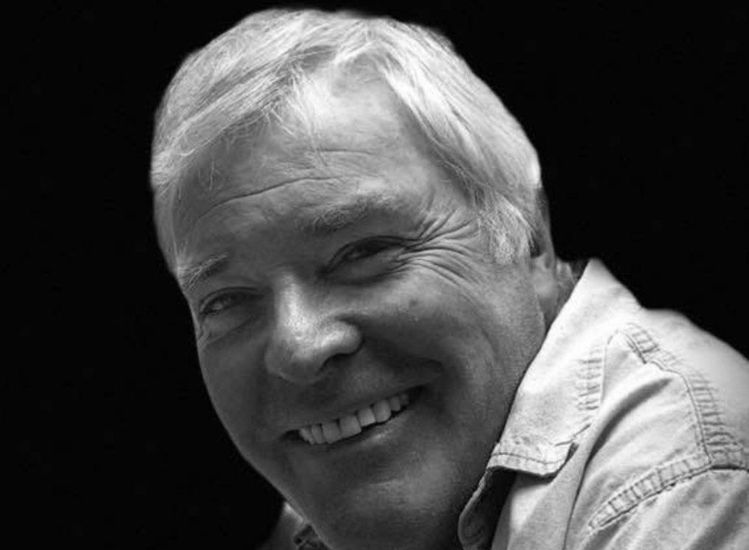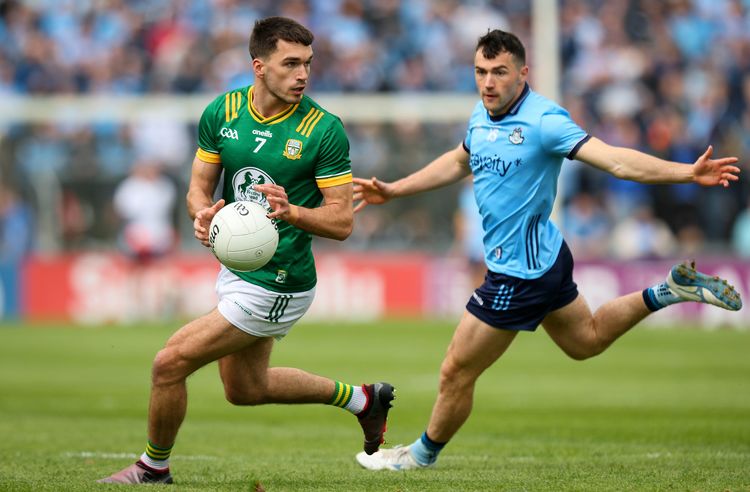Jimmy Breslin, left, pictured with Pete Hamill at the 2014 NYU Glucksman House Gala Dinner, at which Hamill was honored.
JAMES HIGGINS / HIGGINSPHOTONYC.COM
Pat Fenton's profile of and interview with Jimmy Breslin was
published in the March 12-18, 2014, issue of the Irish Echo.
On a recent gray rainy day in Manhattan, I made my way to the Upper West Side to interview the Pulitzer Prize winning-columnist Jimmy Breslin in his apartment, which overlooks the Hudson River. I went up there to ask him his own signature question, “what’s doing? “ His wife, Ronnie Eldridge, wasn’t home, so I waited in the lobby for him to call down to the concierge to send me up.
I sat reading one of his books I brought with me as I waited for him to come down from the roof top pool, where at 85, he still swims daily. He doesn’t smoke anymore, and the drinking is gone. The fun went out of that for him a long time ago. It was an early collection of his columns I was reading, written when he was a young man.
Memories went through my mind of long ago fall mornings in the 1970s of a younger Jimmy Breslin rushing in and out of the Kew Gardens Criminal Court Building on Queens Boulevard where, I worked as a Court Officer in the Arraignment Part at the time, rushing into the Pastrami King across the street, grabbing a handful of cigars at the cash register from Moishe the owner as he picked up some news, always looking for a story. And he found them with his trademark question, “what‘s doing?”
And the stories, which would become newspaper columns, were as fine and clear and simple as a Hemingway story. And they are likely to become the greatest literary style of journalism we will ever see in our time.
“Ask anything,” he said, as I took out some notes I had and sat down on the couch next to him.
I started: “Jimmy, you mentioned on the phone that you were working on a novel. What’s the premise of it?”
“The premise is hard work and hope. I don’t want to go on about it. I’d rather not,” he said, raising his voice to make a point. “I’m not being coy about it. It’s just that it might change in an hour. So leave it alone.”
“When did you first realize that you wanted to be a writer?”
“It was in grammar school. I don’t know – 7th, 8th grade. After that I went to John Adams High School. I made the football team, but I didn’t go to school much. I went to just two classes there. One of them was English, where you had to write long pieces for a teacher. And I was a knockout with that.
“And so I’m standing out in the center of John Adams’ High School, and McGill, he was a history teacher there; he’s going out for a cigar. And he’s from East Rockaway, and he said to me that he had followed my great career at John Adam’s High School. Two subjects only this year.
“And he said, ‘I got a very good idea, Breslin. Go down to the Long Island Press and see this guy and you can get a job there. Because you’re not going to do any good here at the high school.’ The football season was over.
“I went to the Long Island Press for an interview, and the owner jumped because the guy that was working there just quit. Walked out. Just quit. And they needed somebody, and I fit by just showing up. So I started right then and I never stopped. That was it. “
I asked him, “You once said that when you covered a prize fight you learned to go to the losers’ locker room after the fight, not the winners. Where did you pick up that way of working a story? And why?
While the rest of the media was focused on the world leaders and other dignitaries
at JFK’s funeral, Jimmy Breslin interviewed one of the gravediggers.
JFK PRESIDENTIAL LIBRARY
“I always wanted to come in on a story when no one else was there. It started in the Long Island Press. It’s good. Because you’re always alone, which is the best. That was the reason. You’re always alone. It’s the greatest.”
I brought up one of the most famous articles, “You did that too with your story on the grave digger who was assigned to dig President John F Kennedy’s grave. What were your thoughts about that when you got back to New York after you wrote it?”
“I went back to the Tribune office and wrote the column. And then I went out and got on the train to New York. Got off at Penn Station. And I took the train out to Queens on the Long Island Railroad, and I went to Pep McGuire’s Bar on Queens Boulevard. And that was it. Pepi was there and he asked me where I had been. And I said give me a drink. And I was there until midnight.
“I got murdered with whisky,” he said as he remembered a day when his whole writing life was about to take a different course. “My wife had to come down and get me out of the place. And that was it. “
I followed up: “When you were in Pep McGuire’s, did it hit you that you had just talked to the guy who dug President Kennedy’s grave? And you wrote something about it that might be around forever?”
“It didn’t hit me period,” he said, making a fist hit an imaginary bar. “Give it another one, Pepi. Drinking. That was all. I told you, my wife had to come down and get me out of the place.”
The phone rang. He picked it up, and for a moment I heard the younger, grouchy voice of Jimmy Breslin again, the voice from his old Queens Boulevard writing beat. He started out talking softly as he stared out his window at the boat traffic on the Hudson River.
“How could I have a good time? I don’t drink anymore.” Then he raising his voice, he quickly wraps up the phone conversation, like Mario Rivera closing out the last inning of a baseball game. “Well you asked if I had a good time at the party the other night, and I told you. How the f…. could I have a good time if I’m not drinking anymore? Goodbye.”
He doesn’t say who called; he just turns toward me as if these types of calls are just a normal part of his life. And they are. He seems to enjoy them.
Ignoring the distraction, I asked him what was it like to have the actor Richard Burton send a telegram to your publisher, saying that he was “an enormous fan of yours”? And having your publisher print his telegram on the back cover of the first collection of your columns, “The World of Jimmy Breslin?”
“Well I knew him from the bar.”
“What bar?”
“Gallagher’s. And then across the street there was another place where actors went. I was in there a lot. He took me in there, and we would get f…… blind. That’s how I knew him. He was a good fellow.”
“Was Burton different than what you expected after seeing him in movies?”
“He was the same. Nothing changes with him. He was the same as he always was.”
“Did you ever drink with Brendan Behan in your saloon days?”
“Oh yeah. It was in a place on 44th Street [Costello’s]. That was the only thing I ever did then, was go to bars. I stopped drinking finally with a world’s record. It’s been 32 years since I stopped drinking.
“I gave up cigarettes first. The best thing I ever did. Four packs a day I was smoking. I was working at the newspapers and you would leave half of them hanging off the end of the desk until they burned out. So you would have to get another one.
“It was on a day like this,” he said as he stared out the window. “I was crossing Myrtle Avenue into Brooklyn in the rain. And I was waiting for another bus. And that line ran very slow."
He gives you all the small detail about the day, the Jimmy Breslin column detail that made him a famous journalist. And he brings you back there with him on that rainy afternoon on the border of Brooklyn when he stopped smoking.
“So I went inside to this little candy store on Myrtle Avenue and I bought a pack of Pall Malls. I had been home with a bad cold for three days. So this day I went out and I go to work, and I was coughing like a bitch. I started up the first Pall Mall and I had three drags out of it, and I had to throw it way. I coughed so much that I was mad at the cigarette.
“And I got on the bus… And that’s it. I never had another drag since. Luckiest thing I ever did, eh? Forget about it. I would be gone by now.”
Changing the subject, I said, “What do you think of today’s newspaper columnists? You once said that when you started writing newspaper columns there were just a bunch of high school guys doing it. Guys like Pete Hamill, who dropped out of high school, and worked in the Brooklyn Navy Yard. Now they have all kinds of degrees. And they don’t drink, they don’t do anything.”
Breslin replied: “And it reads like they don’t drink. You have to have a couple of drinks to do that job.”
"It seems that was always part of it,” I suggested. “Hanging out was always part of the romance of writing for newspapers.”
“I don’t know about the romance," he said, "but hanging out you could get something.”
“What was it like to work with writers like Murray Kempton?” I asked.
“I’d see him in the bar all the time. Oh yeah, he looked very nice. He drank a lot of whisky.”
Reminded that Kempton rode a bicycle around town, he said: “Sometimes he couldn’t get on the bike. He would have been f…… dead twice.“
I asked him about a night in the early 1970s when he got beaten up really badly in a Queens cocktail lounge by the Irish mobster Jimmy Burke, whom Robert De Niro played (as Jimmy Conway) in the movie “Goodfellas.” Holding him over a table, he almost strangled him to death with his own necktie. Burke felt that Breslin had slighted him with something he said, or wrote.
Most people would shudder thinking back on a memory of what he went through that night, but not Jimmy Breslin. For years, he walked in and out of the mob bars that existed throughout Queens as if he was part of that world. Truth was, it was Breslin’s world too. He made his living putting his by-line on it.
He just quietly shrugged, and said, “I have a bad mouth. And that would start it off. And when I stopped drinking that ended, and nobody could get mad at me. Nobody could get mad at me for the next 40 years.
“That’s because I don‘t do anything to incite them. I haven’t got a guy mad at me in 40 years because they don’t know who the f… I am anymore."
I countered: “They know who you are, alright. That’s another thing you carry with you, whether you will admit it or not, you’re considered one of the greatest newspaper writers in America.”
“Great. That’s good. I accept all compliments.”
He often ran into John Gotti while he was walking around Ozone Park, Queens looking for a story. And Gotti would ask him “What are you looking for?” and he would say, “I’m not looking for anything.”
“Did you spend much time with John Gotti?” I said.
“No. I mean, I saw him a million times but we didn’t go and talk. We’d talk a little, but not much because he had nothing on his mind but shooting people.“
“Did you find that your writing changed when you stopped drinking?
“Writing can’t change, because you’re doing it the same way. You got to use your f…… head. And then it’s day labor. It’s labor. That’s what it is. The main thing is that I’m not drinking. The biggest change for me. Jeez, if I could last without drinking. But if I was drinking, I wouldn’t be here, eh? Something would give.”
“You’re swimming every day,” I said. “What do you get out of swimming -- peace of mind? What is it? Does it relax you?”
“I don’t know if it relaxes you,” Breslin replied. “It just gives you a feeling that you have done something physically to help you. And it does I think. And I’m here. If I’m not drinking and I’m swimming, if that don’t keep me going, well come on, I might as well go out the window.”
I took the conversation in another direction. “The Irish working-class writer world that you and Pete Hamill came out of is just about gone now. Are hard copy daily newspapers also on their way out?”
“Oh, that’s all gone. Those days are gone. Newspapers? I don’t read them. I don’t read the News or the Post. I read the Daily News recently and I said ‘f…, I’ll never look at it again.’ I’m not going to read it. And the other one, The Post, it looks like the Post always did, [laughs] they got the same lay out, but then when you read it, it’s gone. I won’t go there again.
He continued: “The New York Times has colons all through the f……paper. I don’t know what they mean. But there are a couple of good writers there.
He mentioned Dan Barry, and said he liked Jim Dwyer when I brought his name up.
I then asked him about a part of his life that he never wrote about in his column, serving as an usher for many years at Blessed Sacrament Church on 71st Street in Manhattan.
It’s hard to imagine Jimmy Breslin, the tough, bar fighting, two-fisted drinker from Queens Boulevard, the Daily News columnist, putting a collection basket in front of someone on a Sunday morning, and they looking up at him from a church pew and recognizing him.
“I always turned all the money in. I didn’t take any of it,” he said, making a sweeping motion into an imaginary collection basket with his hand.
“You know, for car fare or anything. I always turned it all in,” and he smiles at me, a mischievous Jimmy Breslin, Queens Boulevard wise-guy smile.
He talked about this memory he has of his father, and how he wrote music, and played the piano.
“Was he good at it?” I asked.
“Well, he wrote the Fordham Marching song,” he said. His last memory of him was when he was 6 years old. His mother yelled at his father who was headed for a train. “He said he was going out for a pack of cigarettes. And he never came back."
A days after my interview with Breslin, I found an original copy of the lyrics to the Fordham University Marching song being sold on E-Bay. On the front cover was a head shot of James F. Breslin, and underneath it the words, “music by James F Breslin, composer. “
It has that sort of melancholy, F. Scott Fitzgerald-era, optimism to it: “so sing, men, and swing men, when the drums no longer play. With arms linked and hearts linked in the good old Fordham way.”










